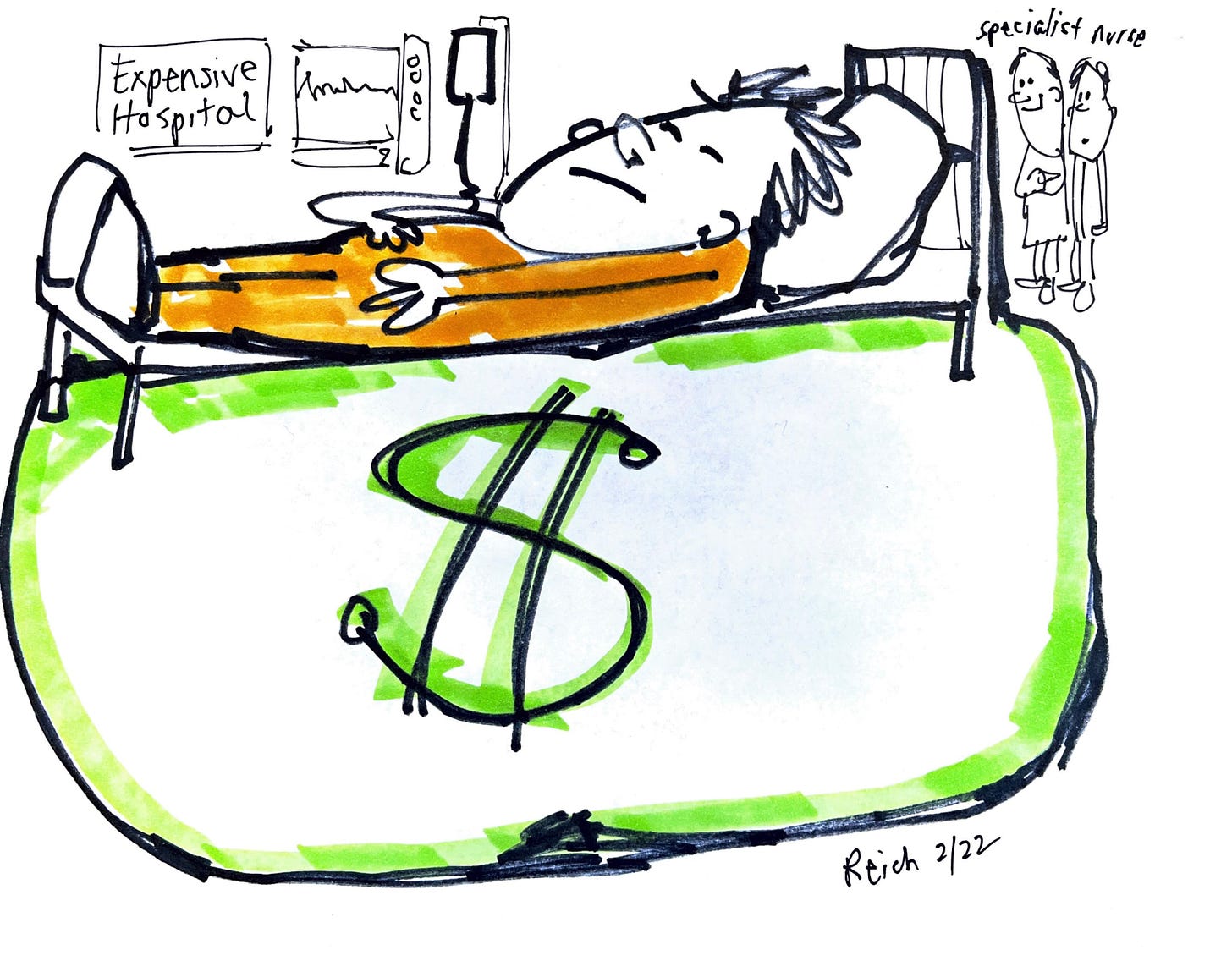For many years, my right ankle has been losing cartilage that keeps my ankle bones from scraping up against each other. The result: increasing inflammation and pain. An orthopedic surgeon suggested replacing the ankle with an artificial one, but the procedure is costly, takes months to heal, and requires lots of physical therapy. So I’ve taken a different route. I cut way back on sugar, began an exercise program aimed at strengthening the muscles around my ankle, and lost twenty pounds. Now, six months later, the ankle pain is almost gone.
I share this with you because I’m testifying today before a House committee that’s considering the future of healthcare in America.
The fact is, we have too many high-priced specialists who know how to do a few complicated and costly things such as replacing a bum ankle, and too few generalists who know enough about the whole body that they’re able to avoid the complicated and costly things. The big money is in the complicated things, so that’s where the talent goes and what hospitals aim for. And if you can pay for it, great. The complicated stuff is what America excels at.
But we’re terrible at the uncomplicated things — not just my cutting back on sugar, exercising, and keeping the weight down, but making sure everyone gets regular checkups from general practitioners who are trained to prevent serious illnesses. The terrible tolls of diabetes, heart disease, and some cancers, for example, are preventable if caught in time.

Even before the pandemic, the typical American family was spending more than $6,000 a year on health insurance premiums. Add in copayments and deductibles that doctors, hospitals, and drug companies also charge, and that sum rises to $6,400. Add in typical out-of-pocket expenses for pharmaceuticals, and it’s at least $6,800. That’s not all, because some of the taxes the typical family pays are for health insurance, too — for Medicare and Medicaid and the Affordable Care Act. Add them in, and the typical household pays $8,975 a year for health insurance. This number doesn’t include what typical workers’ employers spend on their health insurance – which might otherwise go to their wages.
American spending on healthcare per person is more than twice the average in the world’s other thirty-five advanced nations. Yet the United States ranks near the bottom among advanced nations for life span and infant mortality. Americans are sicker, our lives are shorter, and we have more chronic illnesses. Canadians, for example, can expect to live on average almost four and a half years longer than Americans, even though health care spending per person is only about half as high as in the U.S.

Healthcare is so expensive that many Americans put off seeing a doctor until their health has seriously deteriorated. Even with the Affordable Care Act, some 30 million Americans have no health insurance coverage at all.
Not only do too many dollars go to super-specialists and too few to preventive generalists, but the administrative costs involved in private for-profit insurance are humongous. About a third of what the typical American pays for health insurance goes to the people who oversee billing and collections. And then of course there are marketing and advertising expenses, and the profits that go to shareholders or private-equity managers.
Finally, if the pandemic taught us anything, it’s that we need to decouple health insurance from employment. Losing a job shouldn’t mean the loss of a family’s lifeline to healthcare.

The Affordable Care Act was a good start at reform, but today I’m urging Congress*to replace private for-profit health insurance with Medicare for all. This would lead to far lower total costs — including premiums, co-payments, deductibles, and taxes — and it would cover all Americans. People could keep their same doctor or other health-care provider, and could buy private insurance to supplement it — just as some people now buy private insurance to supplement Medicare and Social Security. But as Medicare and Social Security have demonstrated, we shouldn’t need to pay private for-profit insurers boatloads of money to get the insurance we need.
I have no illusions this will happen soon. But the road we’re now on is unsustainable — economically, politically, and socially. Eventually, we’re going to have some version of Medicare for All (and hats off to members of Congress who are leading the way, such as Representatives Pramila Jayapal, Debbie Dingel, and Ro Khanna). The question is how much unnecessary cost and hardship must we bear before we do?

* The hearing was well-attended by members, and the conversation was thoughtful and intelligent. A few Republicans got into their age-old “socialism” rant, but I quietly pointed out that Social Security and Medicare — both hugely popular with the public — were also criticized by Republicans as being “socialist” when first proposed.
** I hope you’ll join me for tomorrow’s second class on Wealth and Poverty — right here on this page.






















Could you possibly invent a more expensive and less effective healthcare system than what we have in the US?